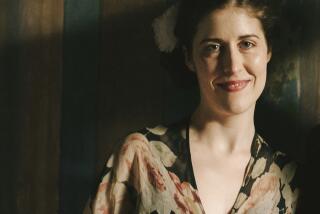Bright Birdsong Speaks Her Mind : OLD DOGS AND CHILDREN, <i> By Robert Inman (Little Brown: $19.95; 448 pp.)</i>
- Share via
Buster Putnam (USMC-Ret.) is sitting on the floor of his workshop bleeding from a gash on his thumb when Bright Birdsong gets there. “ ‘Buster, don’t you know better than to mess around with machinery when you’ve been drinking whiskey?’ She laces her voice with disgust, but not too much.
“ ‘Gin,’ he says.
“ ‘It’s all the same. It’s all whiskey. Don’t quibble over nomenclature.’ ”
That’s Bright Birdsong for you: charming, a gentlewoman (a Southern gentlewoman). Bright’s the main character in Robert Inman’s longish new novel “Old Dogs and Children.” Mrs. Birdsong is a senator’s widow, the current governor’s mother, grandmother of young Jimbo (who reads too much for a boy and stays too clean), mother (awkwardly) of RoseAnn, who must be the most jittery character in modern fiction. Most important, Bright is Dorsey Bascombe’s only child and Dorsey practically built the town of Claxton. Bright Birdsong’s relationships, their sorrows and laughter, are what “Old Dogs and Children” is about. The book’s plot is, well, kind of desultory.
The book meanders along through a couple of hot summer weeks in a small southern town. Bright wins a $50,000 supermarket giveaway; her son, the governor, gets into political hot water; an African-American boy (grandson of Bright’s old friend and political ally) drowns in the river. Claxton’s public swimming pool is, de facto, White Only. Mrs. Birdsong, who once was active in the moral life of her town, decides to take action.
Intertwined with all this, the back story shows us Bright growing up, her parents’ painful, difficult marriage. Like the young girl, we come to know her father’s sawmill, the clamor of the noon whistle, the screech of the saws; we smell the resins of fresh, damp sawdust.
Inman’s prose is always agreeable and sometimes more than that. Here’s what happens when Bright the child asks Hosanna, the family cook, the theological question: “Can God eat toadstools?”
“Hosanna never missed a beat. Slosh-scrub-slosh. ‘Course he could if he wanted to, but He don’t want to. He don’t have to. God don’t have to eat nothing,’ she snorted. ‘Folks think God gets up every morning, puts on his hat and shoes and goes to work, just like everybody else. Folks want God to be just like them, only cuter. Folks get down on they knees and pray, “Oh, God, send me a mess of turnip greens!” She made a wail out of it and Bright giggled . . . ‘God don’t send turnip greens, he lets turnip greens grow . And before they grow, you got to hoe . God do the growin’ but you does the hoein’.’ ”
“Old Dogs and Children” is frequently funny, wise about small-town life, its courtesies and contradictions. And the book does have brilliant moments. When the child Bright sleepily comes upon her parents making love, she “sensed it was the most private of things, something forbidden to her, something at once beautiful and fearful. Then their bodies began to quicken and they strained against each other, calling softly like swans, and she felt a sudden rush of something strange and frightening well up in her--a nameless jumble that spun inside her head and made her feel angry and weak and terribly alone.”
Since Bright’s husband, Sen. Fitzhugh Birdsong, spent his time in Washington and Bright refused to leave Claxton, much of their marriage occured in absentia. The one time Bright came to Washington, she was invited to a smallish White House dinner. Inman’s portrayal of Churchill, F.D.R. and particularly Eleanor Roosevelt is miles above most fictional portraits of historic figures. It is done so well, I wished for more of it.
Inman could have used a tougher editor. It is disconcerting when minor characters like Hosanna, Big Deal O’Neill (local car dealer and political manager) and Bright’s friend Xuripha Deloach linger in the mind longer than important figures like Bright’s husband and her son. Though Dorsey, Bright’s father, is splendidly drawn, her mother Elise is thin as chiffon.
Dorsey Bascombe is unnecessarily contemporary in his views. I doubt that any 1920s logger ever worried about “clear-cutting,” and the obligatory “We don’t use the word ‘nigger’ here” speech Dorsey makes tells us more about Mr. Inman’s views than Dorsey’s. Promising themes--What will Bright do with her share of the money? What happened to Buster Putnam in Korea? Will the Governor be reelected?--are announced, but left unresolved.
There are wonderful images: “Bright slept soundly and rose early and clearheaded when she heard Gladys (the “Old Dog” of the title) banging around under the house and the birds fussing about the trees in the front yard. She put on her housedress and stood for a few minutes on the front porch, taking the new sun and gathering the day about her, letting it open itself to her on its own terms.” But images like that are repeated too often.
Modern-day Claxton seems more like a small town in the ‘50s than the rural South of today. Bright Birdsong’s wish to make a real kid out of Jimbo by getting him into overalls is sweet nostalgia, but most of the small-town kids in my part of the South yearn for expensive Reeboks, just like their city cousins wear.
Still, if “Old Dogs and Children” is slightly frazzled, not quite wrapped tight, it is, like its principal character, Bright Birdsong, unusually charming.
I can think of worse ways to spend a hot summer afternoon than in Mrs. Birdsong’s company.
More to Read
Sign up for our Book Club newsletter
Get the latest news, events and more from the Los Angeles Times Book Club, and help us get L.A. reading and talking.
You may occasionally receive promotional content from the Los Angeles Times.









